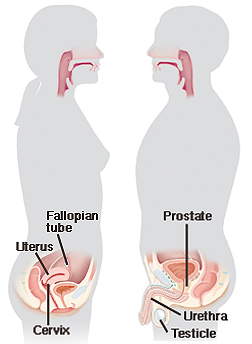What Are Sexually Transmitted Diseases (STDs)?
A sexually transmitted disease (STD) is a disease that is spread during sex. (An STD can also be called STI for sexually transmitted infection.) You can catch an STD if you have sex with someone who has an STD. Any sex that involves the penis, vagina, anus, or mouth can spread disease. Some STDs spread through body fluids such as semen, vaginal fluid, or blood. Others spread through contact with affected skin.
Who Is At Risk?

Places on or in the body where STDs cause damage include reproductive organs, the rectum, and the mouth.
It doesn't matter if you're straight or gay, male or female, young or old. Any person who has sex can get an STD. Your risk increases if:
-
You have more than one partner. The more partners you have, the greater your risk.
-
Your partner has other partners. If your partner is exposed to an STD, you could be, too.
-
You or your partner have had sex with other people in the past. Either of you might be carrying an STD from an earlier partner.
-
You have an STD. The STD may cause sores or other health problems that increase your vulnerability to new infections. Your risk will stay high unless you change the behaviors that put you at risk of the current infection.
Prevent Future Problems
Left untreated, certain STDs can lead to cancer or even death. Some can harm unborn babies whose mothers are infected. Others can cause sterility (not being able to have children). You can prevent these problems with safer sex, regular checkups, and early treatment. Always use a latex condom when you have sex. Get tested if you're at risk. And get treated early if you have an STD.
Getting Checked
The only sure way to know if you have an STD is to get checked by a healthcare provider. If you notice a change in how your body looks or feels, have it checked out. But keep in mind, STDs don't always show symptoms. So if you're at risk of STDs, get checked regularly. If you find you have an STD, be sure your partner gets treatment, too. If not, his or her health is at risk. And left untreated, your partner could pass the STD back to you, or on to others.
Common Symptoms
Be alert to any changes in your body and your partner's body. Symptoms may appear in or near the vagina, penis, rectum, mouth, or throat. They include:
-
Unusual discharge
-
Lumps, bumps, or rashes
-
Sores that may be painful, itchy, or painless
-
Itchy skin
-
Burning with urination
-
Pain in the pelvis, abdomen, or rectum
Even If You Don't Have Symptoms
You may have an STD, even if you don't have symptoms. If you think you are at risk, get checked. Go to a clinic or to your doctor. If your partner has an STD, you need to be tested too, even if you feel fine.
Vaccines to Prevent Disease
Vaccines (also called immunizations) are available to prevent hepatitis A and hepatitis B. These are two kinds of STDs. There is also a vaccine to prevent HPV. This is a virus that can be passed from person to person through sexual contact. Ask your healthcare provider whether any of these vaccines is right for you.







